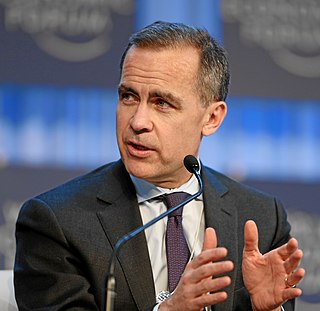
The Bank of England is the central bank of the United Kingdom and the model on which most modern central banks have been based. Established in 1694 to act as the English Government's banker, and still one of the bankers for the Government of the United Kingdom, it is the world's eighth-oldest bank. It was privately owned by stockholders from its foundation in 1694 until it was nationalised in 1946.

Mervyn Allister King, Baron King of Lothbury, is a British economist and public servant who served as the Governor of the Bank of England from 2003 to 2013.

Robert Dinwiddie was a British colonial administrator who served as lieutenant governor of colonial Virginia from 1751 to 1758, first under Governor Willem Anne van Keppel, 2nd Earl of Albemarle, and then, from July 1756 to January 1758, as deputy for John Campbell, 4th Earl of Loudoun. Since the governors at that time were largely absentee, he was the de facto head of the colony for much of the time. Dinwiddie is credited for starting the military career of George Washington.
Ralph Burton was a British soldier and Canadian settler.

Lieutenant-General Francis Grose was a British soldier who commanded the New South Wales Corps. As Lieutenant Governor of New South Wales he governed the colony from 1792 until 1794, in which he established military rule, abolished civil courts, and made generous land-grants to his officers. He failed to stamp out the practice of paying wages in alcoholic spirits, with consequent public drunkenness and corruption. Although he helped to improve living conditions to some degree, he was not viewed as a successful administrator.
Sir Merrik Burrell, 1st Baronet was a British politician.
Samuel Thornton was one of the sons of John Thornton, a leading merchant in the Russian and Baltic trade, and was a director of the Bank of England for 53 years and Governor (1799–1801). He had earlier served as its Deputy Governor. He was Member of Parliament (MP) for Kingston upon Hull from 1784 to 1806 and for Surrey from 1807 to 1812. He and was a member of the Committee for the repeal of the Test and Corporation Acts.

Mark Joseph Carney is an economist and banker. He holds Canadian, British and Irish citizenship and has been Governor of the Bank of England since 2013 and was Chairman of the Financial Stability Board from 2011 to 2018.

Sir Nathaniel Gould was an English merchant and politician who sat in the House of Commons of England from 1701 to 1707 and in the House of Commons of Great Britain between 1707 and 1728.

John Olmius, 1st Baron Waltham, of New Hall, Boreham, Essex, was a British landowner and Whig politician who sat in the House of Commons between 1737 and 1762.
John Hedges, of Finchley, Middlesex, was an English diplomat and politician who sat in the House of Commons from 1722 to 1737.

Humphry Morice was a British merchant, MP and Governor of the Bank of England. He inherited his father's trading business around the age of eighteen, and learned finance and speculation from an uncle. Placed in Parliament through a cousin's interest in 1713, his Whig politics ultimately provoked a breach with his Tory cousin, and he had to be given another seat in 1722 by Robert Walpole's administration. He rose to be Deputy Governor and then Governor of the Bank of England in 1727, but unknown to his contemporaries, his fortune was largely fictitious and he was embezzling from the Bank and his daughters' trust fund. He died suddenly in 1731, perhaps having poisoned himself to forestall the discovery of his frauds, and left behind enormous debts.
Samuel Holden (1675–1740) was an English merchant, politician, and nonconformist activist.
Sir John Ward (c.1650–1726), of Hookfield, Clay Hill, Epsom, Surrey and St Laurence Pountney, London, was a British merchant, banker and politician who sat in the House of Commons between 1701 and 1726. He was an original Governor of the Bank of England and served as Lord Mayor of London in 1718.
Sir James Bateman was an English merchant and politician who sat in the House of Commons from 1711 to 1718. He became Lord Mayor of London and Governor of the Bank of England.
John Rudge, of Mark Lane, London and Evesham Abbey, Worcestershire, was a London merchant and financier, and Whig politician who sat in the House of Commons almost continuously between 1698 and 1734. He was a Governor of the Bank of England from 1713 to 1715.
John Hanger was a merchant of Trinity Minories who was Governor of the Bank of England from 1719 to 1721 when the Bank of England was closely involved in the financing of the South Sea Company. His family were closely associated with the hundred of Bray in Berkshire and a memorial to the family exists in St Michael's Church there.
Matthews Beachcroft was Governor of the Bank of England from 1756 to 1758. He had been Deputy Governor from 1754 to 1756. He replaced Charles Palmer as Governor and was succeeded by Merrick Burrell.








